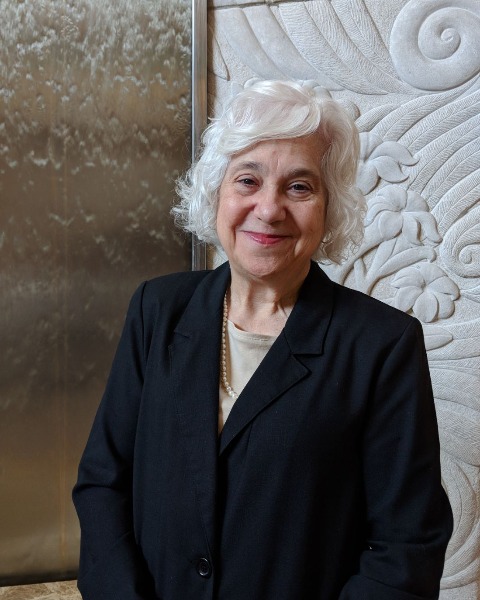Back
Interprofessional Education and Collaborative Practice
Cross-Systems Collaboration and Global Conflict Resolution
Teaching Global Conflict Resolution in Graduate and Undergraduate Social Work from an Interprofessional Approach
Saturday, November 12, 2022
4:15 PM – 4:45 PM
Location: La Jolla

Frances B. Kominkiewicz, PhD, MSW, MSA, LCSW, ACSW, LMFT, CAC
Professor; Director, Social Work Program
Saint Mary's College
Notre Dame, Indiana, United States
Author and Presenter(s)
Overview: Social work education uses a variety of interprofessional teaching approaches which contribute to the depth, breadth, and richness of conflict resolution methods. This paper presents an analysis of academic conflict resolution course descriptions and methods in social work and other disciplines. Variables studied include students’ engagement in global conflict resolution.Proposal text: Demonstrating the ability to teach conflict resolution in order to build racial, social, environmental, and economic justice is integral in undergraduate and graduate social work education. Many disciplines are involved in teaching conflict resolution, and the collaboration of those disciplines are examined in this paper. Through a thorough search of peer-reviewed literature, no content analysis research was located addressing teaching conflict resolution from an interprofessional perspective, including multidisciplinarity, interdisciplinarity and transdisciplinarity perspectives, perspectives which contribute to the depth, breadth, and richness of conflict resolution approaches. This paper also presents an analysis of academic conflict resolution course descriptions and teaching methods in social work and other disciplines. Variables studied include contributions and foci of disciplines teaching conflict resolution courses and students’ engagement in global conflict resolution. The social work discipline, for example, focuses on social, environmental and economic justice in conflict resolution and in CSWE Competency 3 (Council on Social Work Education, 2015). The content analysis, conducted through a random sample of conflict resolution courses through university and college programs in the United States and globally, found that although courses teach the concepts of conflict resolution, courses often are not given these titles in the social work discipline and in other disciplines. Research further found great variability in the number of disciplines involved in conflict resolution, the focus of those disciplines in conflict resolution, the location of conflict resolution courses and programs within the university or college, and the number and types of conflict resolution courses and concentrations. Attendees will also gain knowledge regarding how the research points toward very robust, diverse, and collaborative interprofessional approaches and practices to conflict resolution with opportunities for further research and discussion both in the United States and globally (Conrad, Reyes, & Stewart, 2022; Dyson, del Mar Fariña, Gurrola, & Cross-Denny, 2020; Friedman, 2019; Hatiboğlu, Özateş Gelmez, & Öngen, 2019; Onken, Franks, Lewis, & Han, 2021).
Conrad, J., Reyes, L. E., & Stewart, M. A. (2022). Revisiting opportunism in civil conflict: Natural resource extraction and health care provision. Journal of Conflict Resolution, 66(1), 91–114. doi:10.1177/00220027211025597
Council on Social Work Education (2015). EPAS 2015. Alexandria, VA.
Dyson, Y. D., del Mar Fariña, M., Gurrola, M., & Cross-Denny, B. (2020). Reconciliation as a framework for supporting racial, ethnic, and cultural diversity in social work education. Social Work & Christianity, 47(1), 87–95. https://doi.org/10.34043/swc.v47i1.137
Friedman, B. D. (2019). Noah: A story of peacebuilding, nonviolence, reconciliation, and healing. Journal of Religion & Spirituality in Social Work: Social Thought, 38(4), 401–414. https://doi.org/10.1080/15426432.2019.1672609
Hatiboğlu, B., Özateş Gelmez, Ö. S., & Öngen, Ç. (2019). Value conflict resolution strategies of social work students in Turkey. Journal of Social Work, 19(1), 142–161. https://doi.org/10.1177/1468017318757174
Onken, S. J., Franks, C. L., Lewis, S. J., & Han, S. (2021). Dialogue-awareness-tolerance (DAT): A multi-layered dialogue expanding tolerance for ambiguity and discomfort in working toward conflict resolution. Journal of Ethnic & Cultural Diversity in Social Work: Innovation in Theory, Research & Practice, 30(6), 542–558. 30(6):542-558. doi:10.1080/15313204.2020.1753618
Conrad, J., Reyes, L. E., & Stewart, M. A. (2022). Revisiting opportunism in civil conflict: Natural resource extraction and health care provision. Journal of Conflict Resolution, 66(1), 91–114. doi:10.1177/00220027211025597
Council on Social Work Education (2015). EPAS 2015. Alexandria, VA.
Dyson, Y. D., del Mar Fariña, M., Gurrola, M., & Cross-Denny, B. (2020). Reconciliation as a framework for supporting racial, ethnic, and cultural diversity in social work education. Social Work & Christianity, 47(1), 87–95. https://doi.org/10.34043/swc.v47i1.137
Friedman, B. D. (2019). Noah: A story of peacebuilding, nonviolence, reconciliation, and healing. Journal of Religion & Spirituality in Social Work: Social Thought, 38(4), 401–414. https://doi.org/10.1080/15426432.2019.1672609
Hatiboğlu, B., Özateş Gelmez, Ö. S., & Öngen, Ç. (2019). Value conflict resolution strategies of social work students in Turkey. Journal of Social Work, 19(1), 142–161. https://doi.org/10.1177/1468017318757174
Onken, S. J., Franks, C. L., Lewis, S. J., & Han, S. (2021). Dialogue-awareness-tolerance (DAT): A multi-layered dialogue expanding tolerance for ambiguity and discomfort in working toward conflict resolution. Journal of Ethnic & Cultural Diversity in Social Work: Innovation in Theory, Research & Practice, 30(6), 542–558. 30(6):542-558. doi:10.1080/15313204.2020.1753618
Learning Objectives:
- Upon completion, the participant will be able to gain an understanding of interprofessional approaches to conflict resolution in undergraduate and graduate social work education.
- Upon completion, the participant will be able to apply knowledge to develop conflict resolution courses in social work education
- Upon completion, the participant will be able to apply knowledge to work interprofessionally in teaching conflict resolution in social work education.
